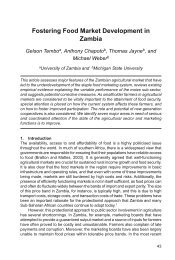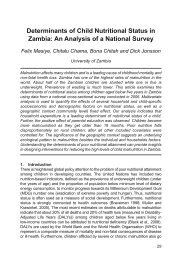Introduction to Basic Legal Citation - access-to-law home
Introduction to Basic Legal Citation - access-to-law home
Introduction to Basic Legal Citation - access-to-law home
You also want an ePaper? Increase the reach of your titles
YUMPU automatically turns print PDFs into web optimized ePapers that Google loves.
(3) <strong>Citation</strong>s <strong>to</strong> all other authorities shall include the page or pages.When treatises or<br />
textbooks are cited, the edition must be designated. In citing authorities other than cases,<br />
references shall be made as follows: Codes, <strong>to</strong> section number; treatises, textbooks and<br />
encyclopedias, <strong>to</strong> section and page; all others, <strong>to</strong> page or pages. Use of the “supra” and<br />
“infra” forms of citation is discouraged.<br />
e. Internal cross-references. Use of "supra" and "infra" is not permitted.<br />
Kansas: Supreme Court citation practice | <strong>Citation</strong> rule(s)<br />
186<br />
Contents | Index | Help | < | ><br />
Examples from Schmidt v. Kan. State Bd. of Technical Professions, 271 Kan.<br />
206, 21 P.3d 542 (2001)<br />
. . . .<br />
Michael Schmidt, a licensed engineer, appeals the decision of the Shawnee County District<br />
Court affirming an order of the Kansas State Board of Technical Professions (the Board). The<br />
Board determined that certain construction drawings prepared by Schmidt constituted the<br />
practice of architecture as defined by K.S.A. 2000 Supp. 74-7003. The Board further held that<br />
Schmidt, unlicensed <strong>to</strong> practice architecture, was in violation of the regulations pertaining <strong>to</strong><br />
professional conduct established by K.A.R. 66-6-4(e) (1995 Supp.) which regulations prohibit<br />
a licensee from affixing a signature, seal, or both, <strong>to</strong> a plan dealing with a subject matter<br />
outside the licensee's field of competence. The Board publicly censured Schmidt because he<br />
affixed his engineer's seal <strong>to</strong> documents dealing with the subject matter of architecture, an<br />
area which it held <strong>to</strong> be outside his field of competence as established by his education,<br />
training and licensing. The Board also required that he pay costs of $ 5,000, an amount the<br />
Board determined was a portion of the Board's investigative cost, expenses, and at<strong>to</strong>rneys fees<br />
in prosecuting the matter, and an amount equal <strong>to</strong> the statu<strong>to</strong>ry limit.<br />
. . . .<br />
Because the primary issue in this appeal involves the interpretation of statutes and regulations,<br />
the rules of statu<strong>to</strong>ry construction set forth in Todd v. Kelly, 251 Kan. 512, 516, 837 P.2d<br />
381(1992), apply. "'"In order <strong>to</strong> ascertain the legislative intent, courts are not permitted <strong>to</strong><br />
consider only a certain isolated part or parts of an act, but are required <strong>to</strong> consider and<br />
construe <strong>to</strong>gether all parts thereof in pari materia."'" Landry v. Graphic Technology, Inc., 268<br />
Kan. 359, 365, 2 P.3d 758 (2000) (quoting Todd, 251 Kan. at 516).<br />
Similarly, when interpreting administrative regulations, the courts generally will defer <strong>to</strong> an<br />
agency's interpretation of its own regulations. The agency's interpretation will not be<br />
disturbed unless it is clearly erroneous or inconsistent with the regulation. Murphy v. Nelson,<br />
260 Kan. 589, 595, 921 P.2d 1225 (1996). However, the administrative agency may not use<br />
its power <strong>to</strong> issue regulations which alter the legislative act which is being administered. In re<br />
Tax Appeal of New<strong>to</strong>n Country Club Co., 12 Kan. App. 2d 638, 647, 753 P.2d 304, rev.<br />
denied 243 Kan. 779 (1988).




